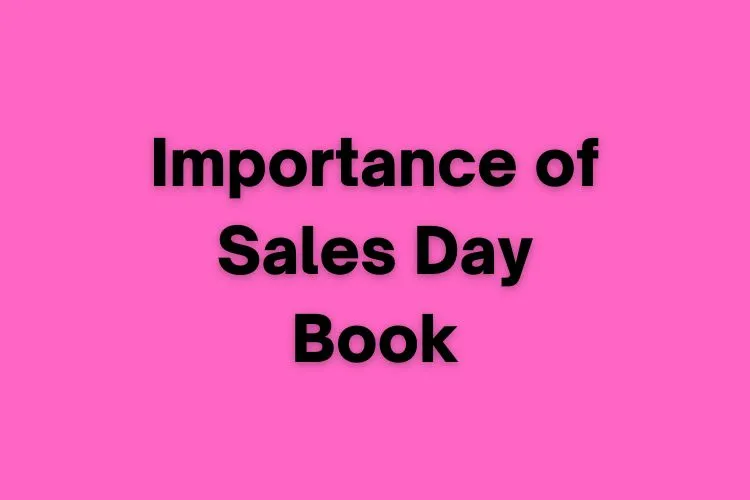Sales Day Book Record in Accounting Types | Format | Importance 2023

A sales day book records sales transactions made by a business on a particular day. The transactions are recorded in the order that they occur, with the earliest ones at the top of the book and the latest ones at the bottom. This allows businesses to track sales activity and identify trends over time.
A sales day book is a record of all sales transactions that occur within a particular time period, usually a day. It is a tool used by businesses to track and record the details of each sale, including the date of the sale, the name of the customer, the items purchased, and the payment method. The sales day book is often used to generate reports on the sales activity of a business, which can be used for financial analysis and decision-making. In some cases, the sales day book may also be referred to as a sales journal or sales ledger.
A Sale Day Book in Business Accounting is a book created to track sales and inventory on sale days. This book can be used to keep track of the products sold, the cost of each product, and the amount of profit or loss made from each sale. This book can also be used to identify trends in product sales over time. Keep your all recording by keeping Golden Rules of Accounting.
Features of Sales Day Book in Accounting
- Date: The sales day book typically includes the date of each sale.
- Customer information: The sales day book may include the name of the customer, their contact information, and any other relevant details.
- Product or service information: The sales day book will typically include a description of the products or services sold, as well as the quantity and unit price.
- Payment method: The sales day book will typically include information on how the customer paid for the products or services, such as cash, credit card, or check.
- Salesperson: The sales day book may include the name of the salesperson who made the sale.
- Total sale amount: The sales day book will typically include the total amount of the sale, including any applicable taxes or discounts.
- Balance due: If the customer has not paid in full for the products or services, the sales day book may include the balance due.
- Notes: The sales day book may include any additional notes or comments related to the sale.
- The total sales price for the transaction
sales day book characteristics
- Here are some characteristics of a sales day book:
- Time-based: A sales day book is typically used to track sales activity on a daily basis, but it can also be used to track sales activity over a longer period of time, such as a week or a month.
- Detailed record-keeping: A sales day book typically includes detailed information about each sales transaction, including the date of the sale, the type of product or service sold, the quantity sold, the price of the sale, and any discounts or promotions applied.
- Organized and easy to read: A sales day book should be organized in a clear and easy-to-read format, with columns for each piece of information and rows for each individual transaction.
- Accurate and up-to-date: A sales day book should be kept accurately and up-to-date to ensure that it reflects the most current sales activity of the business.
- Confidential: A sales day book may contain sensitive financial information, and it is important to keep it confidential to protect the privacy and security of the business.
This information can be used to generate various reports, such as sales by customer or sales by item. The daybook can also be used to track customer payments and reconcile sales with bank statements.
daybook, accounting, sales, transactions, customer, item, quantity, price, total, report, bank statement, reconcile.

Importance of sales day book in accounting
The sales day book is an important tool for businesses, as it provides a record of all sales transactions made on a given day. This information can be used to generate reports and track payments received from customers.
The daybook can also be used to reconcile sales with bank statements. By tracking this information, businesses can ensure that their finances are accurate and up-to-date.
What Would the Function of a Sale Day Book be?
A sale day book is a financial document that records all sales made on a specific day. This document can be helpful in tracking inventory, calculating profit and loss, and more. Additionally, it can be used to prove the legitimacy of a sale.
A sale day book can also be used as a marketing tool to generate interest in a product or service. By keeping track of the number of sales made on a specific day, businesses can gauge how much demand there is for their products or services.
How to Calculate a Sales Day Book?
When you sell goods or services, you need to track the sale and book the revenue accordingly. This is commonly done with a sale day book. The sale day book is simply a journal that records all of the sales transactions for a given period of time. It can be anything from a single day to several weeks.
Many accounting software programs include features that make it easy to create and maintain a sale day book. You just need to enter in the details of each transaction, including the date, price, product/service sold, and customer name/number. You can also track how much money was earned on each sale and calculate your net income (profit) for the period.
If you don’t have access to accounting software, there are other ways to keep track of your sales transactions. You can use a spreadsheet program like Microsoft Excel or Google Sheets to enter in all of the information manually. Whatever method you choose, make sure you track all of your sales so you can accurately calculate your profits and pay your taxes accordingly!
How Many Accounts to Keep in a Sale Day Book?
Sales day books are used to track sales for the day. The book is divided into days and each day is followed by an account. This allows you to see how many total sales were for each account on that particular day.
What are the characteristics of a Sales Day Book?
The sales day book is a record of all sales transactions made on a particular business day. This book can be used to track inventory, reconcile accounts, and generate reports. In addition, it helps managers identify potential problems with their sales processes and make adjustments accordingly.
The book should include information about the type and amount of product sold, the price of each item, and the names of the customers who made the purchases. Sometimes, sale day books also contain information about the quantity or size of the order.
Some businesses also keep a tally of how much money they’ve made on Sale Day. This data can help managers strategize when to hold future sales events and evaluate their marketing efforts.
